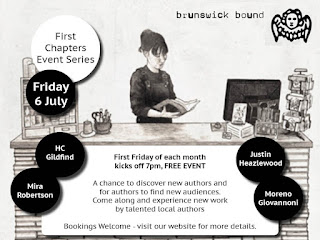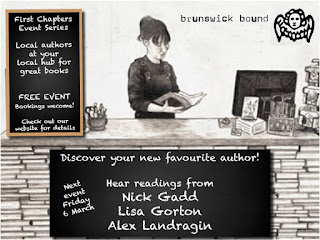First Chapters Q&A with Mira Robertson
Mira Robertson is an award-winning screenwriter who has also published short fiction. Her feature film credits include the multi-award winning films Only the Brave and Head On, co-written with director Ana Kokkinos.
Mira will be reading from her first novel The Unexpected Education of Emily Dean.
We asked Mira some general bookish questions because we were interested in finding out more about her and this is what she had to say.
1. Brunswick Bound has asked you to read a chapter from your published work. Tell us what we can expect from the chapter you have chosen?
 TheUnexpected Education of Emily Dean is my first novel, so I can only answer this
question in relation to it. Whether future novels will be similar in tone,
story, or theme, I can’t yet say. However, thinking about this novel, at one
level it is a coming of age story with Australian forebears like My Brilliant Career, The Getting of Wisdom and I For Isobel. It’s concerned with the
inner life – emotional and psychological – of the main character, Emily, and
how she navigates the world at this very specific moment. At the same time, the
novel also touches on all kinds of issues such as wartime xenophobia, class
divisions, religious intolerances and even the transformative power of
literature. It’s very Australian, being rooted in such a particular time and
place. And it’s underpinned by a wry humour, as well as taking the reader to
some quite emotional places.
TheUnexpected Education of Emily Dean is my first novel, so I can only answer this
question in relation to it. Whether future novels will be similar in tone,
story, or theme, I can’t yet say. However, thinking about this novel, at one
level it is a coming of age story with Australian forebears like My Brilliant Career, The Getting of Wisdom and I For Isobel. It’s concerned with the
inner life – emotional and psychological – of the main character, Emily, and
how she navigates the world at this very specific moment. At the same time, the
novel also touches on all kinds of issues such as wartime xenophobia, class
divisions, religious intolerances and even the transformative power of
literature. It’s very Australian, being rooted in such a particular time and
place. And it’s underpinned by a wry humour, as well as taking the reader to
some quite emotional places.
I recently reread The Prime of Miss Jean Brodie by
Muriel Spark and was once again blown away by how wonderful it is. Less is
always more with Muriel Spark and this short novel brims with savage wit and,
ultimately, aching sadness. Spark packs so much into the novel in a seemingly
effortless way and Miss Jean Brodie is a magnificent, flawed
character—charismatic, romantic, contradictory and full of hubris. In some
respects, she’s a feminist and ahead of her times, but her fascination with fascism
and Mussolini reveals a darker side to her that has tragic consequences. Oh, to
write like Muriel Spark. But if you can’t, just enjoy reading her instead.
Visit our website for more information about First Chapters.
Mira will be reading from her first novel The Unexpected Education of Emily Dean.
We asked Mira some general bookish questions because we were interested in finding out more about her and this is what she had to say.
1. Brunswick Bound has asked you to read a chapter from your published work. Tell us what we can expect from the chapter you have chosen?
From
the chapter I’m going to read, you will be transported to a homestead in
country Victoria circa 1944 where you can expect to meet some of the important
characters in the novel, including Emily Dean. I think you’ll get a strong
sense of her, as well as the tone of the novel, which has been described
variously as funny, poignant and wry.
2.
How would you describe the kinds of books that you write?
 TheUnexpected Education of Emily Dean is my first novel, so I can only answer this
question in relation to it. Whether future novels will be similar in tone,
story, or theme, I can’t yet say. However, thinking about this novel, at one
level it is a coming of age story with Australian forebears like My Brilliant Career, The Getting of Wisdom and I For Isobel. It’s concerned with the
inner life – emotional and psychological – of the main character, Emily, and
how she navigates the world at this very specific moment. At the same time, the
novel also touches on all kinds of issues such as wartime xenophobia, class
divisions, religious intolerances and even the transformative power of
literature. It’s very Australian, being rooted in such a particular time and
place. And it’s underpinned by a wry humour, as well as taking the reader to
some quite emotional places.
TheUnexpected Education of Emily Dean is my first novel, so I can only answer this
question in relation to it. Whether future novels will be similar in tone,
story, or theme, I can’t yet say. However, thinking about this novel, at one
level it is a coming of age story with Australian forebears like My Brilliant Career, The Getting of Wisdom and I For Isobel. It’s concerned with the
inner life – emotional and psychological – of the main character, Emily, and
how she navigates the world at this very specific moment. At the same time, the
novel also touches on all kinds of issues such as wartime xenophobia, class
divisions, religious intolerances and even the transformative power of
literature. It’s very Australian, being rooted in such a particular time and
place. And it’s underpinned by a wry humour, as well as taking the reader to
some quite emotional places.
So, what kind of book is it? What kind of book
have I written? Have I answered the question? I am not sure.
3.
What was the first book that you read (or had read to
you) that left an impression on you?
The
first story I can actually remember having read to me (by my mother) was Rikki-Tikki-Tavi from The Jungle Book by Rudyard Kipling. I’m sure she read this
story to me and my siblings many times. It’s a short story set in India about a
pet mongoose who protects a British family from two murderous cobras. Despite
knowing nothing of India, and having never seen a mongoose or a cobra, this
story absolutely fascinated me. The brave mongoose, the deadly cobras, and the
life and death battles that ensued left an indelible impression.
4.
Do you believe that books should answer life’s big questions?
I
don’t think writers have any special claim to know the answers to the big
questions of life. Perhaps it is more that books should ask some of life’s big
questions, and interrogate those questions in interesting, challenging, amusing,
and all sorts of other ways.
5.
What’s your go-to solution for writer’s block?
If
only I had a failsafe solution! I am prone to writer’s block so it’s a touchy
subject for me. I do have a few different approaches to try and trick myself
into writing. One of those is writing by hand with a trusty old fountain pen.
Sometimes, abandoning the keyboard and returning to handwriting can have a
liberating effect. I’ve found that scrawling words on paper, with lots of
crossing out, ink blots and spelling mistakes takes the pressure off and seems
to allow me more freedom to play. Sadly though, it doesn’t always work!
6. Which words or phrases do you overuse?
You
would have to ask my publisher, Aviva Tuffield, although I have sworn her to
secrecy.
7.
What do you put down as your occupation when asked?
Screenwriter.
Now I can say screenwriter and author, which is very satisfying!
8.
What is the question that you hope never to be asked in an author Q&A?
Answering
this question seems like tempting fate. But to be honest, I don’t know. I
suspect that I will have to be asked it first.
9.
What question do you hope you will be asked and why?
My
hope is that an interviewer will be genuinely interested in my book and
therefore have lots of thoughtful and possibly even surprising questions for
me. I would like to be asked a question that reveals something about the novel
that I haven’t thought of. I have heard it said that readers (interviewers) can
be more perceptive about a work than the author and that’s fascinating, if a
bit unnerving for said author!
10.
Which book that you have read do you think should be better known or more
widely read?
Visit our website for more information about First Chapters.




Comments
Post a Comment